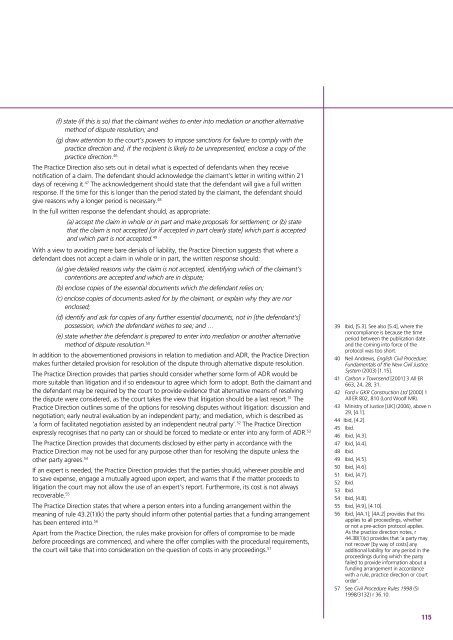Facilitating the Early Resolution of Disputes without Litigation
Facilitating the Early Resolution of Disputes without Litigation
Facilitating the Early Resolution of Disputes without Litigation
You also want an ePaper? Increase the reach of your titles
YUMPU automatically turns print PDFs into web optimized ePapers that Google loves.
(f) state (if this is so) that <strong>the</strong> claimant wishes to enter into mediation or ano<strong>the</strong>r alternativemethod <strong>of</strong> dispute resolution; and(g) draw attention to <strong>the</strong> court’s powers to impose sanctions for failure to comply with <strong>the</strong>practice direction and, if <strong>the</strong> recipient is likely to be unrepresented, enclose a copy <strong>of</strong> <strong>the</strong>practice direction. 46The Practice Direction also sets out in detail what is expected <strong>of</strong> defendants when <strong>the</strong>y receivenotification <strong>of</strong> a claim. The defendant should acknowledge <strong>the</strong> claimant’s letter in writing within 21days <strong>of</strong> receiving it. 47 The acknowledgement should state that <strong>the</strong> defendant will give a full writtenresponse. If <strong>the</strong> time for this is longer than <strong>the</strong> period stated by <strong>the</strong> claimant, <strong>the</strong> defendant shouldgive reasons why a longer period is necessary. 48In <strong>the</strong> full written response <strong>the</strong> defendant should, as appropriate:(a) accept <strong>the</strong> claim in whole or in part and make proposals for settlement; or (b) statethat <strong>the</strong> claim is not accepted [or if accepted in part clearly state] which part is acceptedand which part is not accepted. 49With a view to avoiding mere bare denials <strong>of</strong> liability, <strong>the</strong> Practice Direction suggests that where adefendant does not accept a claim in whole or in part, <strong>the</strong> written response should:(a) give detailed reasons why <strong>the</strong> claim is not accepted, identifying which <strong>of</strong> <strong>the</strong> claimant’scontentions are accepted and which are in dispute;(b) enclose copies <strong>of</strong> <strong>the</strong> essential documents which <strong>the</strong> defendant relies on;(c) enclose copies <strong>of</strong> documents asked for by <strong>the</strong> claimant, or explain why <strong>the</strong>y are norenclosed;(d) identify and ask for copies <strong>of</strong> any fur<strong>the</strong>r essential documents, not in [<strong>the</strong> defendant’s]possession, which <strong>the</strong> defendant wishes to see; and …(e) state whe<strong>the</strong>r <strong>the</strong> defendant is prepared to enter into mediation or ano<strong>the</strong>r alternativemethod <strong>of</strong> dispute resolution. 50In addition to <strong>the</strong> abovementioned provisions in relation to mediation and ADR, <strong>the</strong> Practice Directionmakes fur<strong>the</strong>r detailed provision for resolution <strong>of</strong> <strong>the</strong> dispute through alternative dispute resolution.The Practice Direction provides that parties should consider whe<strong>the</strong>r some form <strong>of</strong> ADR would bemore suitable than litigation and if so endeavour to agree which form to adopt. Both <strong>the</strong> claimant and<strong>the</strong> defendant may be required by <strong>the</strong> court to provide evidence that alternative means <strong>of</strong> resolving<strong>the</strong> dispute were considered, as <strong>the</strong> court takes <strong>the</strong> view that litigation should be a last resort. 51 ThePractice Direction outlines some <strong>of</strong> <strong>the</strong> options for resolving disputes <strong>without</strong> litigation: discussion andnegotiation; early neutral evaluation by an independent party; and mediation, which is described as‘a form <strong>of</strong> facilitated negotiation assisted by an independent neutral party’. 52 The Practice Directionexpressly recognises that no party can or should be forced to mediate or enter into any form <strong>of</strong> ADR. 53The Practice Direction provides that documents disclosed by ei<strong>the</strong>r party in accordance with <strong>the</strong>Practice Direction may not be used for any purpose o<strong>the</strong>r than for resolving <strong>the</strong> dispute unless <strong>the</strong>o<strong>the</strong>r party agrees. 54If an expert is needed, <strong>the</strong> Practice Direction provides that <strong>the</strong> parties should, wherever possible andto save expense, engage a mutually agreed upon expert, and warns that if <strong>the</strong> matter proceeds tolitigation <strong>the</strong> court may not allow <strong>the</strong> use <strong>of</strong> an expert’s report. Fur<strong>the</strong>rmore, its cost is not alwaysrecoverable. 55The Practice Direction states that where a person enters into a funding arrangement within <strong>the</strong>meaning <strong>of</strong> rule 43.2(1)(k) <strong>the</strong> party should inform o<strong>the</strong>r potential parties that a funding arrangementhas been entered into. 56Apart from <strong>the</strong> Practice Direction, <strong>the</strong> rules make provision for <strong>of</strong>fers <strong>of</strong> compromise to be madebefore proceedings are commenced, and where <strong>the</strong> <strong>of</strong>fer complies with <strong>the</strong> procedural requirements,<strong>the</strong> court will take that into consideration on <strong>the</strong> question <strong>of</strong> costs in any proceedings. 5739 Ibid, [5.3]. See also [5.4], where <strong>the</strong>noncompliance is because <strong>the</strong> timeperiod between <strong>the</strong> publication dateand <strong>the</strong> coming into force <strong>of</strong> <strong>the</strong>protocol was too short.40 Neil Andrews, English Civil Procedure:Fundamentals <strong>of</strong> <strong>the</strong> New Civil JusticeSystem (2003) [1.15].41 Carlson v Townsend [2001] 3 All ER663, 24, 28, 31.42 Ford v GKR Construction Ltd [2000] 1All ER 802, 810 (Lord Woolf MR).43 Ministry <strong>of</strong> Justice [UK] (2006), above n29, [4.1].44 Ibid, [4.2].45 Ibid.46 Ibid, [4.3].47 Ibid, [4.4].48 Ibid.49 Ibid, [4.5].50 Ibid, [4.6].51 Ibid, [4.7].52 Ibid.53 Ibid.54 Ibid, [4.8].55 Ibid, [4.9], [4.10].56 Ibid, [4A.1]; [4A.2] provides that thisapplies to all proceedings, whe<strong>the</strong>ror not a pre-action protocol applies.As <strong>the</strong> practice direction notes, r44.3B(1)(c) provides that ‘a party maynot recover [by way <strong>of</strong> costs] anyadditional liability for any period in <strong>the</strong>proceedings during which <strong>the</strong> partyfailed to provide information about afunding arrangement in accordancewith a rule, practice direction or courtorder’.57 See Civil Procedure Rules 1998 (SI1998/3132) r 36.10.115
















